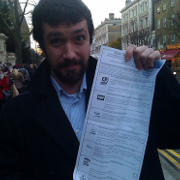
Russia (MNN) — Most of the votes have been counted in Russia's
Parliamentary elections.
Upsets came from all corners. The communists gained ground in the votes, while Prime Minister Vladimir
Putin's party lost ground. In fact, United
Russia was expected to have enough seats to form a slim parliamentary majority.
However, Joel Griffith with Slavic Gospel Association says news
reports are shaping another picture. "They're claiming that might
even be an inflated figure because of vote fraud."
Amidst allegations of fraud–common to the electoral process, the complaints
are sticking. "Those claims were backed by some international
observers, pointing to some procedural violations and alleged ballot stuffing
and other things."
Several thousand
people protested Monday night against Prime Minister Vladimir Putin and his
party. Griffith says the whole scenario tells a
story. "What it tells you is maybe the Russian people aren't quite
as satisfied as maybe some of the pundits would have you believe."
U.S. Secretary of State Hillary Rodham Clinton also expressed
concern over the accusations surrounding Russia's parliamentary elections. Reports from the Associated Press cast into
doubt the validity or strength of United Russia's mandate.
As of late Monday
afternoon, the Central Election Commission reported that United Russia led with
just under 50%, trailed by the Communists with 19%, Just Russia with
13%, and the Liberal Democrats with nearly 12%. Gains
made by the Communist Party raised questions of policy reversal to come. Griffith doesn't think so. "I
think it's a little bit early to read too much into the Communist numbers
coming in. I don't think that necessarily means Communism is resurgent, as a
philosophy; I think it may be a way to send a message."
Griffith goes on to say that changes noted in and around the
Commonwealth of Independent States could have some sympathetic ears in the
Duma. "As we've seen some of the countries around Russia–such as
Kazakhstan–implement these draconian religion laws, you sort of wonder if we
aren't going to see this being pushed in Russia eventually. It's our hope and
prayer that that doesn't happen."
Such laws are likely to prove problematic to Christmas outreach
for SGA. Changes in the political climate of the CIS could also have a lot of
influence in Russia. "We really need to pray that whatever
happens, this will not negatively impact the evangelical Church and our ability
to worship and proclaim the Gospel."
Griffith urges prayer. There
is a growing sense of urgency due to the ideology they're seeing gain in popularity throughout
Europe. He says, "Resources are needed: Russian
Bibles, Russian Christian literature, also a need for pastoral training and
orphan ministry. There are more than 700,000 orphans across Russia that
need to hear the Gospel."
Regardless of the outcome of the elections, Griffith asks for prayer "that
the door would remain open for us to help evangelical churches there seize
those opportunities."
